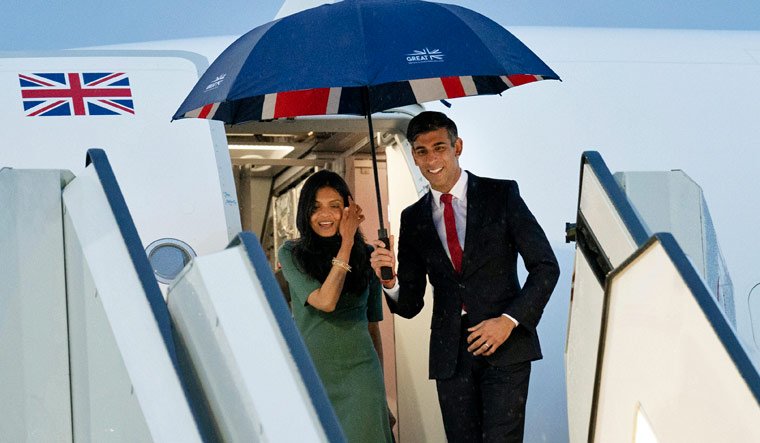In a significant development, British Prime Minister Rishi Sunak and his wife, Akshata Murty, arrived in Japan for the G7 Summit, where they secured a groundbreaking agreement known as the “Hiroshima Accord.” This accord aims to foster a stronger partnership between the United Kingdom and Japan, encompassing economic, security, and technology collaboration. The agreement is seen as a strategic move to counterbalance China’s growing dominance in the region.
The newly formed UK-Japan global strategic partnership underscores the commitment of both nations to work closely together to address shared challenges and pursue mutual interests. The accord is expected to strengthen bilateral ties, boost economic cooperation, and enhance security cooperation, ultimately promoting stability and prosperity in the Indo-Pacific region.
One of the key aspects of the accord is the establishment of a Semiconductors Partnership. This initiative aims to facilitate ambitious research and development cooperation and promote skills exchange in the crucial sector of semiconductors. By bolstering collaboration in this area, the partnership seeks to enhance supply chain resilience, which is of utmost importance considering the significance of semiconductors in various industries and their vulnerability to disruptions.
Moreover, the United Kingdom has also announced that its Carrier Strike Group (CSG) warship will return to the Indo-Pacific in 2025. This decision follows the successful maiden voyage of the CSG to the region, which included a visit to India in 2021. The return of the CSG reinforces the United Kingdom’s commitment to maintaining a robust presence in the Indo-Pacific, supporting regional stability and security.
During his visit to Japan, Prime Minister Sunak made history by becoming the first British Prime Minister to visit Hiroshima. Hiroshima holds immense historical significance as the site of the devastating atomic bombing during the Second World War. Sunak’s visit to Hiroshima symbolizes a deep commitment to peace, reconciliation, and understanding the consequences of nuclear warfare.
The UK-Japan “Hiroshima Accord” marks a significant milestone in the relationship between the two nations. By strengthening economic ties, enhancing security cooperation, and promoting technological collaboration, the accord not only benefits the United Kingdom and Japan but also serves as a robust response to China’s increasing influence in the region. This partnership aims to create a balance of power, safeguard shared interests, and contribute to the overall stability and prosperity of the Indo-Pacific region.
The UK-Japan “Hiroshima Accord” represents a comprehensive effort to forge a closer and more strategic partnership between the United Kingdom and Japan. With a focus on economic, security, and technology collaboration, this accord seeks to counterbalance China’s dominance in the region. By establishing a Semiconductors Partnership and reaffirming the United Kingdom’s commitment to the Indo-Pacific through the return of its Carrier Strike Group, the accord sets the stage for a stronger and more resilient alliance. Prime Minister Sunak’s visit to Hiroshima further underscores the commitment to peace and understanding, marking a historic moment in bilateral relations.




